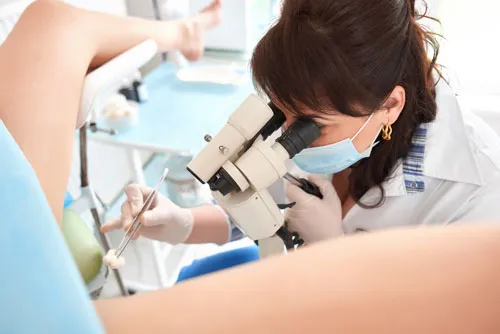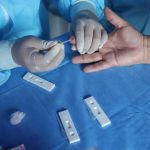You have probably heard of the common test known as a Pap smear which usually checks your cervical cells for cancer. However, what happens if your Pap tests are abnormal? Dr. Michael C Cardwell will recommend a colposcopy that closely examines your cervix, vulva, and vagina to check for any signs of disease. Colposcopy can also screen for the HPV virus if your results are positive. If your doctor detects abnormal tissue, he may perform a biopsy for further testing. The following article will answer common questions you may have about a colposcopy.
Table of Contents
What Does Colposcopy Do?
You may need this procedure to check for existing cancer cells or signs that could indicate cancer in the future. Your doctor will check your cervical cells, your vagina, and your vulva for precancerous cells. Also, a colposcopy can test for genital warts and polyps, which are noncancerous growths. Sometimes, your doctor may use colposcopy to evaluate abnormal vaginal bleeding and itching in your vulva. Your doctor may recommend a colposcopy if your Pap test and pelvic exam results are abnormal. Also, your doctor may recommend the procedure if you have a positive human papillomavirus (HPV) test.
Is The Procedure Surgical?
Colposcopy is not surgical because your doctor only passes an instrument to view inside your body. However, if your doctor decides to perform a biopsy, it may be considered minor surgery. Your doctor may find abnormalities in your tissue, and so will remove a sample of the abnormal tissue and take it for testing in the lab.
What Will It Be Like To Undergo Colposcopy?
You will not require anesthesia during the procedure. Instead, you will lie on an exam table and then keep your legs apart so your doctor can insert a speculum to widen your vagina. Your doctor will then pass a colposcope to view your vagina and cervix with a closer look while seated. Next, your doctor may apply a vinegar solution to your cervix to provide a better view of suspicious areas.
Will The Procedure Be Painful?
The procedure is mostly painless, but you will likely feel pressure when your doctor inserts the speculum. The vinegar solution may also cause a burning sensation in your cervix. As for a biopsy, you may feel a cramping sensation when your doctor takes out a tissue sample.
What Will Happen After The Exam?
You will likely experience light spotting after a biopsy in the next two days. You may also experience slight vaginal pain that will last a few days and a vaginal discharge that may appear black. Your doctor will recommend pads to manage the bleeding. Meanwhile, you can resume normal activities while avoiding inserting anything through your vagina.
Colposcopy is a simple and painless procedure that aims to rule out possible cancer by identifying any precancerous cells early enough. You can receive early treatment if your doctor detects cervical cancer soon before its advancement. Therefore, do not worry about the procedure. Instead, talk to your doctor about getting a colposcopy and eliminating possible cancer. During the procedure, your doctor may also need to perform a biopsy, which removes a sample of your abnormal tissue and tests it further. You can resume normal activities after your treatment as you recover from slight vaginal pain and light bleeding.








